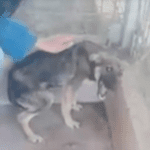Can Dogs Eat Frozen Vegetables? As a responsible pet owner, you want to provide your dog with the best nutrition possible. You may be wondering if it is okay to feed frozen vegetables to your dog. In this post, we’ll take an in-depth look at the question of “Can Dogs Eat Frozen Vegetables” and we’ll provide you with the information you need to make decisions regarding your dog’s diet.
Understanding a Dog’s Nutritional Needs
Dogs have specific nutritional needs that are not met by the typical human diet. Although they are primarily carnivorous, a diet that includes some plants is beneficial. Vegetables are beneficial to your puppy health because they contain fiber, vitamins and minerals.
The Benefits of Vegetables in a Dog’s Diet
When vegetables are included in a canine diet, there are many benefits. They have the ability to aid in better digestion, weight maintenance and general health. Vegetables such as carrots and sweet potatoes can be used as natural dental remedies to help your pup maintain healthy teeth.
Nutritional Value of Frozen Vegetables
The nutritional value of frozen vegetables is well preserved after being frozen, making them a practical food option for both people and canines. To retain as many nutrients as possible, they are typically picked at their peak ripeness and then flash-frozen. A balanced diet for your puppy includes plenty of frozen vegetables, but it’s important to know which vegetables contain certain nutrients.
Safety Precautions
There are a few steps you should take before adding frozen vegetables to your dog’s diet. First, you shouldn’t use frozen vegetables that have been pre-seasoned or pre-sauteed. Some of these additives can be toxic to hounds or cause stomach problems. Choose frozen vegetables that don’t have any added seasonings or flavorings.
Introducing Frozen Vegetables to Your Dog
Your canine should be fed small amounts of frozen vegetables. Slowly introduce the new food into their diet and see how they react. Keep an eye out for signs of gastrointestinal distress such as nausea, vomiting, diarrhea or bloating. The amount of the new ingredient can be increased over time if your dog is enjoying it.
Suitable Vegetables for Dogs
Dogs should not eat any vegetables. Some may be harmful or difficult to digest. However, there are many vegetables that are safe for dogs. Vegetables such as carrots, peas, green beans and sweet potatoes are often recommended for a pooch diet. Rich in nutrients and generally well-tolerated, these options cover a broad spectrum of dietary needs.
Preparing Frozen Vegetables for Dogs
It is important to thoroughly boil frozen vegetables before giving them to your dog. Dogs may have trouble digesting raw vegetables, which can lead to stomach problems. The ideal way is to boil or steam the vegetables till they are soft. Condiments such as salt and butter are harmful to your dog’s health and should be avoided.
Serving Size and Frequency
Your dog’s size, age and general health will determine how many servings of frozen vegetables you serve him. One tablespoon is a good starting point for small dogs, and two or three tablespoons is a good starting point for larger breeds. Your dog’s individual needs will determine the size and frequency of feedings, so it’s best to check with your veterinarian.
Signs of Allergic Reactions
Most dogs have no problem eating vegetables, although some can be allergic or sensitive to specific types of produce. Watch for signs of an allergic reaction, such as itching, rashes or abdominal pain. If your pet is allergic to a particular vegetable, you should immediately stop giving it that vegetable and consult your veterinarian.
Other Considerations
Frozen vegetables are a great supplement to commercial dog food diets, but should not be used instead. It is essential to feed your dog a healthy diet that meets all of his nutritional needs. Instead of relying on frozen vegetables as a regular part of your diet, you should consider them more of a special treat.
Homemade Frozen Vegetable Treats for Dogs
Homemade frozen vegetables are a delicious and nutritious way to incorporate frozen vegetables into your dog’s diet. Vegetables can be blended or finely chopped and then mixed with a small amount of low-sodium chicken broth. Fill ice cube trays with liquid and freeze them. These tasty snacks are a perfect addition to a dog’s summer diet.
Potential Risks and Drawbacks
Most dogs can benefit from eating frozen vegetables, but there are some negatives to be aware of first. When first introduced to vegetables, some dogs develop gastrointestinal distress or gas.
Consulting with a Veterinarian
Talk to your veterinarian before making any major changes to your dog’s diet. They will be able to tailor their advice to your dog’s specific needs and ensure that adding frozen vegetables won’t hinder his health.
Monitoring Your Dog’s Health
When you start feeding your dog frozen vegetables, be sure to keep an eye on his health. Assess their general health including their appetite, vitality, coat and demeanor. Please consult your veterinarian if you notice any serious changes or have any concerns.
Conclusion
We answered “Can Dogs Eat Frozen Vegetables?” in this post. Finally, frozen vegetables are acceptable for dogs’ diets. There are many reasons why adding vegetables to your dog’s diet is a good idea. Vegetables can be a healthy addition to your dog’s diet, but only if you choose dog-friendly options, cook them properly, and introduce them gradually. Prioritize your dog’s well-being above everything else, and if you have any concerns, speak with your veterinarian.







